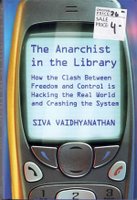Saturday, January 07, 2006
The Anarchist in the Library
 I just started reading The Anarchist in the Library by Siva Vaidhyanathan [New York: Basic Books, 2004]. I don't know how it will develop but my initial impression is good.
I just started reading The Anarchist in the Library by Siva Vaidhyanathan [New York: Basic Books, 2004]. I don't know how it will develop but my initial impression is good.The writing is clear and he gives a simple but rather precise and short history of Anarchism over the last 200 years. It's obviously aimed at a general audience rather than Anarchists. This is remarkable and refreshing in my opinion. I get rather fatigued reading Anarchist theory written to other Anarchists. I find the details of sectarian Anarchist theory interesting but yawn-inducing as well. I'm sure more dedicated Anarchists than I might argue that such discussion is vital to the process of consensus-building but if it presents neophytes with difficulty understanding the core values of Anarchism, then that's rather self-defeating.
Anarchy is not necessarily chaotic and dangerous. It is organization through disorganization -- anarchistic tactics generally involve uncoordinated actions toward a coordinated goal. Instead of formal leadership structures, anarchism relies on agreements, conventions, conversation, and consensus to move the group toward action. Anarchy is by definition non-hierarchical, radically democratic. It is possible for nonanarchists to employ anarchistic tactics or join anarchistic organizations in the sense of believing that the state should wither, crumble, or fall. Just as exploiting socialist institutions such as public schools or farm subsidies does not make one a socialist, so protesting the World Trade Organization or using a peer-to-peer service to share music does not entail flying a black banner, wearing a black mask, or smashing a McDonald's restaurant. (p 3-4)This is clear and draws important points, particularly that Anarchism is not chaos and, at it's core, Anarchism is profoundly democratic. In the US, we have become so used to "representational democracy," we often find it difficult to imagine a personal level of immediate democracy. I suspect this is why US citizens imbue so much energy in and personal identification with the President, pro and con: any citizen who voted for the Presidency voted directly either for or against the person in office. Any voter (or citizen) has a personal stake in how the President acts.
Anarchism is not about passing your voice up the representational political foodchain. It is about personal action and responsibility. It doesn't devolve down to voting once every year or two or four. It involves voting with your hands, feet and mind every day. It is action within the context of your community.
Well, that's what it is to me. Other Anarchists' mileage will certainly and undoubtedly vary from mine. Welcome to a living, breathing version of freedom rather than a rhetorical version. In point of fact, I'm not really sure I would label myself an Anarchist but I'm certainly sympathetic and supportive of the philosophy as I understand it.
 The CR FAQ - An Introduction to Celtic Reconstructionist Paganism
The CR FAQ - An Introduction to Celtic Reconstructionist Paganism





